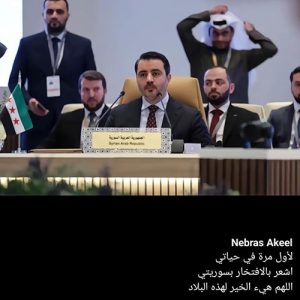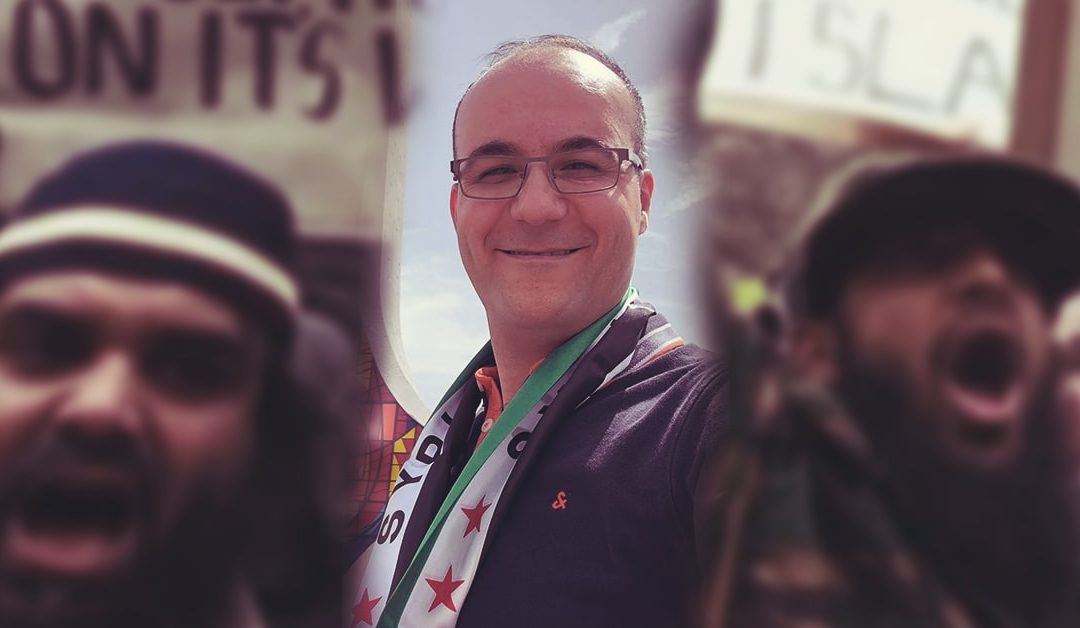Article Summary
This article addresses a striking case involving a cultured young Syrian man living in Europe who supports an extremist terrorist group. It highlights the dangers this poses to global stability and examines the deep-rooted reasons that may drive some individuals in stable and secure environments to adopt extremist ideologies. The article discusses the ideological, psychological, and social dimensions of this phenomenon and raises fundamental questions about the roles of belonging, identity, and a sense of worth in shaping extremist attitudes, moving beyond the usual superficial explanations.
This article addresses a striking case involving a cultured young Syrian man living in Europe who supports an extremist terrorist group. It highlights the dangers this poses to global stability and examines the deep-rooted reasons that may drive some individuals in stable and secure environments to adopt extremist ideologies. The article discusses the ideological, psychological, and social dimensions of this phenomenon and raises fundamental questions about the roles of belonging, identity, and a sense of worth in shaping extremist attitudes, moving beyond the usual superficial explanations.
Nebras.. A Model of the Intellectual Indirectly Supporting Terrorism from Within Europe
He is not a terrorist and may never have carried a weapon in his life. He cannot be accused of terrorism because he has not explicitly promoted terrorism or violence, nor has he likely killed or physically harmed anyone. However, the truth is that he is far more dangerous than that. On his accounts, followed by hundreds of thousands, Nebras openly supports extremist groups (the terrorist group Hay'at Tahrir al-Sham), which contributes to brainwashing especially the younger generations and unintentionally sends them the message that attaining power through terrorism and killing people is natural, even commendable, and that those groups who reached power through terrorism are heroes. This means that the use of violence and terrorism is justified according to what he inadvertently promotes.
The groups supported by Nebras in Damascus have a well-known bloody history and are primarily classified as terrorist organizations. They are listed on the international terrorism lists in the United States, Europe, and many other countries around the world, which makes openly supporting them tantamount to endorsing terrorism.
The groups supported by Nebras in Damascus have a well-known bloody history and are primarily classified as terrorist organizations. They are listed on the international terrorism lists in the United States, Europe, and many other countries around the world, which makes openly supporting them tantamount to endorsing terrorism.
The danger lies in the fact that those groups and figures supported by Nebras are known for their bloody history and have killed thousands of innocent people before coming to power. Therefore, it sends a message to the angry against any ruling authority in any country that the use of violence and terrorism is justified. The groups supported by Nebras have used bombings and suicide attacks for many years. Instead of being condemned by intellectuals and demanded to be prosecuted, some intellectuals glorify them and consider them heroes and liberators of the country. This, in turn, opens the door for thousands to use violence and terrorism to achieve power and gains as long as it is justified. Here lies the crucial step, and that is why we said that what Nebras and similar media figures do is no less dangerous than direct terrorism, if not more dangerous.
The psychological manipulation behind supporting extremist groups
Amid the ongoing debates about extremism and terrorism, it is often assumed that the main motivation behind supporting terrorist groups is poverty, oppression, or direct injustice. But what if the supporter is someone living in Europe, in a stable and safe environment, holding refugee status and having access to education, care, and protection? This is not a theoretical assumption, but a reality we see in cases like “Nibras,” a young man residing in Europe who openly promotes a government affiliated with Hay'at Tahrir al-Sham (formerly Jabhat al-Nusra, an offshoot of the ISIS terrorist organization) — classified as a terrorist organization — and expresses his support for its ideology through social media platforms.
This paradox raises a fundamental question: What drives a person like Nibras, who survived the horrors of war and reached a country that respects human rights and provides him with legal protection, to support an extremist armed group that practices violence and suppresses dissent? How can someone who is supposed to have been freed from fear and oppression become a voice defending a terrorist system seeking to impose its vision through weapons and threats?
To understand this phenomenon, it is not enough to rely on superficial or stereotypical explanations. Rather, it is necessary to delve into the ideological and psychological factors that may lead some individuals to find in these groups a sense of meaning or belonging, even from within the safest and freest environments.

Nibras A Symbol of Radicalization from Within
A photo posted by Mr. Nibras celebrating after the occupation of Syria by the terrorist group Hay'at Tahrir al-Sham.
Ideological and Religious Influence
Often, direct exposure to oppression or injustice is not a prerequisite for adopting extremist ideology. An educated individual living in a stable environment like Europe may appear on the surface to be immune to these influences, but in reality, they can be vulnerable through modern social media and closed social circles. Today’s internet, especially platforms like YouTube, Telegram, and Twitter, provides a fertile environment for the spread of extremist ideological content, including distorted religious sermons and emotional clips documenting the suffering of Muslims in conflict zones, which creates a distorted perception of reality for the viewer.
Some extremist groups exploit this space to spread rigid religious interpretations, claiming to represent the “true Islam,” and portray the terrorist group as the vanguard defending the Muslim Ummah against what is depicted as a global aggression. In these narratives, complex geopolitical conflicts are reduced to a battle of “truth versus falsehood” and “faith versus disbelief,” making it easier for individuals who are not specialists in religion or politics to accept and emotionally engage with this binary classification.
What increases the danger of these influences is that they do not appear all at once but gradually infiltrate through what is called "slow radicalization." A person may start with content that does not seem extremist at first glance, such as posts condemning some injustice or calling to support a just cause, but over time moves to justify violence or support armed groups under the pretext of “defending religion.” With habitual exposure to this type of discourse, their cognitive references change, and they begin to see the world from the perspective of the group that influenced them, adopting its narratives and ways of justification and analysis.
The dilemma is that this transformation is not only due to ignorance but may be driven by a sense of cultural or psychological alienation. A person who feels they do not fully belong to the society they live in, or feels disconnected from their original identity, may find in extremist ideological discourse a form of belonging and certainty, which reinforces their attraction to it.

A Facebook post publicly declaring support for the terrorist known as Al Shaibani, who was convicted of terrorist operations.
A Facebook post in which Nibras expresses his pride and admiration for the figure Asaad Al-Shaibani, who is convicted of terrorist operations when he was in ISIS and is internationally wanted.
Desire for Rebellion and Feeling of Power
Even in the most stable and comfortable environments, such as those provided by European countries, the human psyche remains complex and full of inner conflicts. Some individuals, despite enjoying a stable material life and good education, feel marginalized or without real influence in their surroundings. This feeling of insignificance may not only result from external circumstances but is sometimes linked to an internal experience of existential anxiety or a sense of emptiness, which drives the person to seek a heroic role or a purpose "greater than themselves."
The desire for rebellion here does not always mean directly challenging authority or breaking the law, but it can be a form of silent or deep rejection of social reality. The individual may feel that the society they live in does not grant them a distinctive identity or status but rather dissolves them into a collective model that does not show their uniqueness or value. At this point, extremist ideas become attractive; they not only offer a clear narrative about the world but also promise that the person will be "part of something great," with a role and a message, and a voice in a great battle between truth and falsehood.
In this context, supporting extremist groups becomes a kind of psychological compensation. Instead of remaining an ordinary individual without influence, the person sees themselves as a soldier in the "army of truth," contributing to "achieving justice" or "defending the oppressed." This transformation gives them a sense of power and breaks their feeling of weakness or marginalization. Some individuals also adopt this path as a form of violent rejection of Western culture or the values of their societies, especially if they see contradictions or double standards, whether at the level of foreign policy or civil rights.
It is important to note that these motivations do not always stem from a deep religious belief but are sometimes driven by instinctive feelings: anger, envy, a sense of betrayal, or even the search for an "adventure" that makes them feel alive. Extremist groups are skilled at playing on these psychological chords, reshaping scattered personal motivations into an organized ideological framework that appears "heroic" on the surface but is actually based on self-destruction and destruction of others.

How Extremist Ideologies Reach Refugees in Europe
You always see extremists exaggerating in displaying outward signs of formal religiosity.
The Necessity of Combating Religious Extremism from its Roots
In light of the above, it can be said that the support of an educated person living in a stable and safe environment for terrorist groups is not a random or superficial matter, but rather the result of a complex interplay of intellectual, psychological, and social factors. This support does not necessarily arise from oppressive experiences or personal tragedies, but may be shaped through continuous exposure to extremist ideological discourse that exploits legitimate feelings such as anger, empathy, or the need for belonging.
Extremist ideologies do not always need a poor or marginalized environment to thrive; thanks to the internet and informal influence networks, they can reach any individual, anywhere, and slowly but steadily reshape their consciousness. The psychological tendency to seek identity, role, or meaning makes some individuals easy prey for this type of discourse, even if they originally enjoy a good social status and high education.
This reality compels societies, especially in Europe, to rethink prevention methods against extremism. The battle is no longer limited to drying up the sources of "poverty" or "ignorance," but has become a battle at the level of awareness, identity, and belonging. Combating extremist thought requires building alternative intellectual systems capable of providing individuals with meaning and belonging without leading them to violence, and presenting a moderate religious discourse that is intellectually convincing and psychologically fulfilling.
Young people – especially those of immigrant origins – should also be supported with real opportunities for integration and community participation that give them a sense of value and protect them from being attracted to ideologies that offer false promises of power or heroism. An individual who feels seen and appreciated in their society is less likely to be drawn to discourse that promises glory through the destruction of others.
Sources:
U.S. Department of State:
In May 2018, the United States designated Hay'at Tahrir al-Sham as a "Foreign Terrorist Organization," considering it an extension of Jabhat al-Nusra, formerly affiliated with Al-Qaeda.
Human Rights Watch report discussing the barriers faced by Syrian refugee children in Turkey in accessing education, highlighting the challenges that may contribute to their exposure to extremism.

